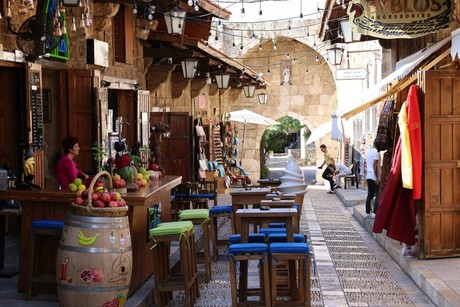In the coastal city of Byblos, Lebanon, Richard Alam, a young bartender, faces a stark decline in business at his pub, a result of heightened tensions along the Lebanon-Israel border during the conflict between Israel and Hamas. Alam, 19, illustrates the downturn by noting a whiskey bottle opened two weeks prior still remains unfinished, a stark contrast to the pub’s previous rate of consumption.
Lebanon’s economic crisis, already dire after four years, worsens as the hospitality industry grapples with the impact of the ongoing conflict. The Gaza-based Hamas group’s attacks on southern Israel, followed by Israeli retaliation and ground operations in Gaza, have escalated hostilities, particularly along Lebanon’s southern frontier, involving Israel and Hezbollah, an ally of Hamas.
This escalation has had far-reaching effects. Western and Arab nations have advised their citizens to evacuate Lebanon due to fears of a broader conflict. Byblos, reliant on tourism and located on Lebanon’s northern coast, has seen a dramatic drop in patronage. Alam, donning a bow tie and suit, notes a reduction from 40-50 tables daily to a mere seven at most.
Similarly, Mona Mujahed’s souvenir shop, once a hub for tourists and locals, now sits quiet, with unsold items lining the shelves. Mujahed, 60, laments the lack of business and income.
The hospitality sector in Lebanon, already battered by a severe financial crisis since 2019, has suffered immensely. Tony Ramy, head of an industry syndicate, highlights that half of the nation’s restaurants, cafes, and nightclubs have closed due to the economic downturn. The industry was just beginning to see a resurgence with the return of expatriate visitors following the COVID-19 pandemic and the devastating Beirut port explosion in 2020. However, the recent conflict has shattered this recovery, causing client numbers to plummet significantly.
Cross-border skirmishes have resulted in numerous casualties in Lebanon, predominantly Hezbollah combatants, but also civilians, as well as casualties in northern Israel.
The conflict has also impacted air travel, with Lebanon’s Middle East Airlines (MEA) cutting flights and reporting a significant drop in passenger numbers from the region and Europe.
In Beirut’s Hamra district, the four-star Hotel Cavalier experiences a surge in cancellations. Ayman Nasser El Dine, the hotel manager, describes the dire situation in the empty hotel lobby, noting a drastic reduction in room occupancy and future reservations.
Despite the grim situation, Pierre Ashkar, head of the hotel owners’ syndicate, remains hopeful. Drawing on Lebanon’s history of resilience through past conflicts, including the civil war and the 2006 war with Israel, he believes the sector will recover once stability returns, though he anticipates a delay before travel advisories are revised and business normalizes.


